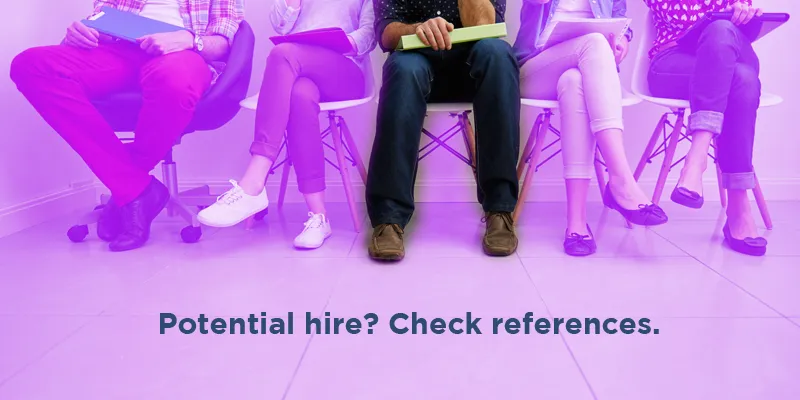6 questions to ask while checking references of potential hires
It is often said that employees are the life-blood of any organisation, and hence, hiring the right employees becomes crucial. According to a survey done by job search site Careerbuilder, a wrong or bad hire not just leads to monetary losses for the company, it also leads to lost productivity, negative impact on the morale of other employees, fewer sales and increased costs to hire and train new workers. The Harvard Business Review points out that almost 80 percent of employee turnover is due to bad hiring decision. So, how can you do away with hiring the wrong candidate?

Image : iStock
Resumes are turning fluffier and fancier by the day, and now, hiring managers cannot just rely on the information provided by the candidates themselves to make the final decision. The best way to make the right choice is by checking the references a candidate has provided on their resume. By asking the right questions, you can make a better decision if or not a candidate in question fits the job profile, and more importantly, your company’s culture, well. So here are a few good questions to ask while checking references:
How do you know the candidate?
This is the obvious starting point and will set the stage for the tone of the questions that follow. It is important to understand the relationship between a potential hire and the reference. If the reference is the candidate’s previous boss, this person would be in a better position to answer questions relating to their work responsibilities and ethic. If the reference is a co-worker, they would be able to comment on the candidate’s ability to work in a team and their communication and social skills with their peers. Also, find out how long this person has known and worked with the candidate. The longer the relationship, the more genuine and credible their responses would be.
What were the specific responsibilities of the position that the candidate held?
This might seem like a redundant question because nowadays, resumes come packed with information on a person’s job roles and accomplishments. However, another survey by Careerbuilder says that almost 58 percent of hiring managers have caught a lie on a resume. According to employers, 57 percent of potential hires projected an embellished skill set, 55 percent fabricated their responsibilities at their previous jobs, 42 percent lied about their dates of employment and 34 percent about their job titles. So, it helps to clearly cross-check what position and responsibilities the candidate held while they worked with the reference.
How did the candidate perform at the job?
This is a question that can be posed to a senior manager or supervisor who worked with the candidate. The answer to this question will help hiring managers determine whether the candidate will be capable of filling in the requirements of the job at hand. What you should be essentially looking for are dedication, commitment to assigned work, the ability to handle pressure, willingness to take initiative and good communication skills. You should probe more in this direction if the answer is too short or vague to make sure how the candidate scores on these grounds.
What were the candidate’s weaknesses, and how did they respond to advice on dealing with them?
It is common for references to keep talking about a specific client’s strengths and downplay their weaknesses. This question will make them face it head on and give you a clear idea on what the candidate would have most likely skipped on their resume and during the interview. Their response to feedback regarding their weakness is a good measure of how easy or hard it is to train the candidate if they are hired.
Why did the candidate leave?
If you receive glorified opinions on the employee’s performance while he was at his previous job, it would help to check why he left the organisation. This will give you an idea whether the job at hand fits the candidate’s larger purpose of career development. It will help you determine how long a candidate will likely stay in your organisation and also let you analyse whether the candidate’s decision to leave their employer was well-thought-out or impulsive.
Would you rehire them?
The answer to this question will sum up all what you need to know about the candidate. It will reflect on the candidate’s work ethic, their attitude towards work stress, their communication skills and how well they got along with their peers. However, do not assume that a negative answer to this question is always because of bad performance or work ethics. Find out why the reference wouldn’t hire them back. For all you know, it might be because they decided to leave the company when a more lucrative offer dropped by.
Hiring the right person for a job is a tough and challenging task. Reference checks are a good way to ensure that you are headed in the right direction. But do not limit your checks to just reinforcing the information given by the candidate on their resume. Dig deeper and ask intelligent questions to determine if the candidate is, indeed, the right fit for the job.



